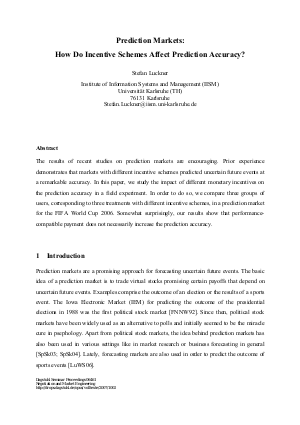Prediction Markets: How Do Incentive Schemes Affect Prediction Accuracy?
Author Stefan Luckner
-
Part of:
Volume:
Dagstuhl Seminar Proceedings, Volume 6461
Part of: Series: Dagstuhl Seminar Proceedings (DagSemProc) - License:
 Creative Commons Attribution 4.0 International license
Creative Commons Attribution 4.0 International license
- Publication Date: 2007-05-10
File

PDF
DagSemProc.06461.20.pdf
- Filesize: 312 kB
- 10 pages
Document Identifiers
Subject Classification
Keywords
- Prediction Markets
- Incentive Engineering
Metrics
- Access Statistics
-
Total Accesses (updated on a weekly basis)
0Document
0Metadata
Abstract
Prediction markets are a promising approach for forecasting future events. The basic idea of a prediction market is to trade virtual stocks whose final value is tied to the outcome of uncertain future events. Market prices can then be interpreted as predictions of the likelihood of those future events. In information efficient markets, prices represent all available information about the participants’ valuations at any time. The results of recent studies on prediction markets are encouraging. Prior experience in this field demonstrates that real money as well as play money markets predicted future events at a remarkable accuracy. Experimental economists most probably would insist that performance-related payment is required in order to obtain valid conclusions about economic behavior. Payments based on the participants' performance are usually intended to provide incentives for rational – or at least well considered – decision making. On the other hand, there is evidence that monetary incentives do not necessarily increase performance. We study the impact of different monetary incentives on prediction markets in a field experiment. In order to do so, we compare three groups of users, corresponding to three treatments with different incentive schemes, in a prediction market for the FIFA World Cup 2006. The subjects of the first group are paid a fixed amount. To subjects in the second group we promise a payment which linearly depends on their deposit value in the prediction market. In the third group, individuals are paid according to their ordinal rank. We study the predictive power of markets depending on the incentive scheme. The goal of our work thus is to analyze the impact of different incentive schemes on the market quality and the predictive power of markets. Based on these results we want to give advice on engineering incentive schemes for future prediction markets.
Cite As Get BibTex
Stefan Luckner. Prediction Markets: How Do Incentive Schemes Affect Prediction Accuracy?. In Negotiation and Market Engineering. Dagstuhl Seminar Proceedings, Volume 6461, pp. 1-10, Schloss Dagstuhl – Leibniz-Zentrum für Informatik (2007)
https://doi.org/10.4230/DagSemProc.06461.20
BibTex
@InProceedings{luckner:DagSemProc.06461.20,
author = {Luckner, Stefan},
title = {{Prediction Markets: How Do Incentive Schemes Affect Prediction Accuracy?}},
booktitle = {Negotiation and Market Engineering},
pages = {1--10},
series = {Dagstuhl Seminar Proceedings (DagSemProc)},
ISSN = {1862-4405},
year = {2007},
volume = {6461},
editor = {Nick Jennings and Gregory Kersten and Axel Ockenfels and Christof Weinhardt},
publisher = {Schloss Dagstuhl -- Leibniz-Zentrum f{\"u}r Informatik},
address = {Dagstuhl, Germany},
URL = {https://drops.dagstuhl.de/entities/document/10.4230/DagSemProc.06461.20},
URN = {urn:nbn:de:0030-drops-10022},
doi = {10.4230/DagSemProc.06461.20},
annote = {Keywords: Prediction Markets, Incentive Engineering}
}
